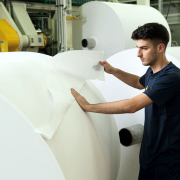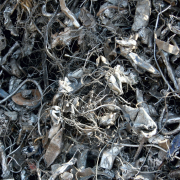Paper Division: Paper Recyclers Should Embrace AI and Consider Carbon Credits
The importance of artificial intelligence (AI) and carbon credits in the future of the paper recycling sector were highlighted to the Paper Division session at the BIR World Recycling Convention in Abu Dhabi on 24 October.
Ranjit Baxi, Managing Director of J&H Sales International in the UK and founding President of the Global Recycling Foundation, argued the sector should harness the power of AI to improve quality, efficiency and costs, as well as verifying “green” audit trails. He challenged the sector to focus on the creation of a global carbon credit system whereby paper and other recyclers would be financially rewarded for their role in saving CO2 as part of the drive to Net Zero.
Mr Baxi’s presentation, “Sustainable global shift in recovered fibre – 2030 perspective” considered the current state of the sector and what could change within the coming years. It was a visionary speech which Paper Division President Francisco Donoso of Dolaf Servicios Verdes S.L in Spain praised for “opening our minds to new perspectives” in areas not often discussed in the sector.
The speaker shared five key factors that determined successful global trade: logistics costs, currency volatility, economic outlook, demand, and quality control. With parts of the world developing local collections, he believed that exporting lower grades of any fibre would by 2030 be “a no-go area” and more fibre would end up in energy recovery.
Improving quality and efficiency in sorting plants will be key in the coming years, Mr Baxi asserted, with AI, robotics and optical sorters all helping to achieve this. Paper mills will demand green audit trails and AI in data systems “will play a very important part in our industry” in generating them, as well as transforming logistics and payment systems.
The speaker acknowledged that voluntary carbon credits (VCCs) bought by carbon emitters to offset their CO2 emissions was not a current focus for the sector but “in the next five years, this is what you will all be talking about”. Earning credits by recycling paper and other materials could bring in US$ 1-2bn for stakeholders across the global recycling chain, he believed. “We are supplying 240 million tonnes of recovered fibre to generate about 430 million tonnes of new paper across the world. That 240 million tonnes can be, should be, and must be part of the VCC system.”
Mr Baxi thought the Indian market had big growth prospects: “Demand for recovered fibre in India will grow first and foremost because of e-commerce.” There are expected to be 300 million people in India using e-commerce by 2025, increasing packaging demand. Capacity at Indian paper mills, of which there are around 750, is projected to grow from 14 million tonnes to over 20 million tonnes by 2030 and paper consumption is projected to be 25 million tonnes by 2030. “The good news for us is that 75% of Indian paper mills are totally dependent on recovered fibre,” Mr Baxi said. Around 30% of domestic fibre in India is recovered and it imports around 12 million tonnes.
Considering exports of key paper grades to India over the last 18 months, Mr Baxi called 2023 “a roller coaster ride” with prices falling 50%. “Volatility in fibre prices and sea freight costs are becoming more and more important for paper mills to decide which region and which supplier to buy from.” In 2022, sea freight to India was around US$ 1,400 and today was nearer US$ 700. “It is helping to tell us that the market now is more stable. The volatility phase is over.”
Simone Scaramuzzi, Sales and Purchasing Director at LCI Srl in Italy, described the market situation in Europe. Mills were not working fully and buying only what was necessary, he said, due to a drop in e-commerce and consumer demand. Energy costs are now around pre-Covid levels and collection levels had fallen 25-30%. “We are now exporting more than selling to local mills.” Shipping costs had fallen but Mr Scaramuzzi did not anticipate any market improvement this year.
Discussing the Middle East, Atul Kaul, Director Pulp & Paper at Waraq in Saudi Arabia, said the region produces four million tonnes of recycled container board but “every mill is expanding, and every mill needs more quality paper”. Even so, fibre was being pulled out of the region to Southeast Asia due to demand there. Mr Kaul said that after peaking in 2022, the industry “came to a crash” in 2023 when prices and demand plummeted. He agreed with Mr Baxi that efficiency would be critical in the future and that “only the best will survive, and the weak will close down”.
Source: BIR (Brussels, October 30, 2023)






